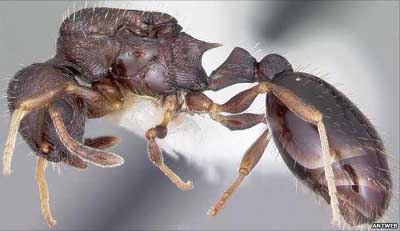 A study of the ant species Temnothorax longispinosus has revealed that it can spot its worst enemy and react with appropriate aggression.
A study of the ant species Temnothorax longispinosus has revealed that it can spot its worst enemy and react with appropriate aggression.
The ant colonies are often invaded by slavemaker ants, which steal their pupae. So when the ants spot a slavemaker, they attempt to kill it by biting and stinging.
But the insects do not waste their energy on less threatening intruders.
The results were published in the journal Ethology.
The team, led by Inon Scharf and Susanne Foitzik from the Johannes Gutenberg University of Mainz in Germany, wanted to find out how these socially complex insects reacted to intruders of different species.
To do this, they brought ant colonies into their laboratory.
In the wild T. longispinosus inhabits mixed deciduous forests across the north-east of the US, nesting in cavities of acorns or sticks in the leaf litter.
“We introduced workers of four different ant species into the ant colonies,” Dr Scharf explained to BBC Nature.
“The first was an unfamiliar species – one that didn’t share this ant’s habitat. The second was an ant from the same species and the third was a familiar competitor – a related species that did inhabit the same areas.”
Finally, the ants encountered the most dangerous intruder – the slavemaker ant.
Slavemakers invade other ant colonies and steal their brood, often killing the host queen and workers in the process.
The enslaved workers emerge from the stolen host brood inside the slavemaker nest. They then carry out routine tasks for the slavemaker – tending the queen, raising young and foraging for food.
When the little T. longispinosus ants encountered a slavemaker, they attacked it – biting and stinging.
When they met less threatening opponents, they simply tried to drag them from the nest.
“It is surprising – they’re making a clear distinction,” said Dr Scharf.
“But it makes sense in terms of evolution.
“They don’t waste their energy responding aggressively to every single intruder. It’s logical to adjust their response to the threat.”
-With bbc.co.uk input Image credit: AntWeb



